Filter by
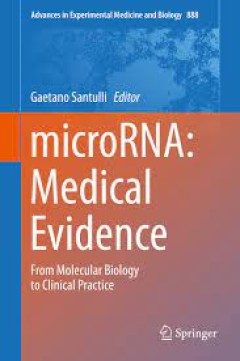
microRNA: Medical Evidence From Molecular Biology to Clinical Practice
This volume explores microRNA function in a wide array of human disorders, providing a clinical basis for precision medicine and personalized therapies using these molecules. The twenty-one chapters, all authored by internationally-renowned experts, open with an introduction contextualizing microRNA manipulation within today’s initiatives towards precision medicine. The following chapters exp…
- Edition
- -
- ISBN/ISSN
- 978-3-319-22671-2
- Collation
- -
- Series Title
- -
- Call Number
- -
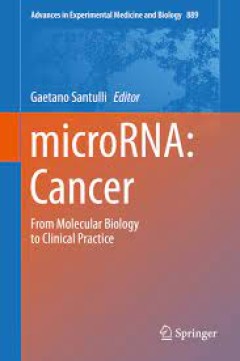
microRNA: Cancer From Molecular Biology to Clinical Practice
This volume thoroughly explores of the functional role of microRNAs in cancer. It not only expertly describes the molecular mechanisms underlying the malignant transformation process but also compiles cutting-edge research on microRNAs in several forms of cancer, including colorectal cancer, pancreatic cancer, leukemia/lymphoma, prostate cancer, lung cancer, ovarian cancer, and bone cancer. Dis…
- Edition
- -
- ISBN/ISSN
- 978-3-319-23730-5
- Collation
- -
- Series Title
- -
- Call Number
- -
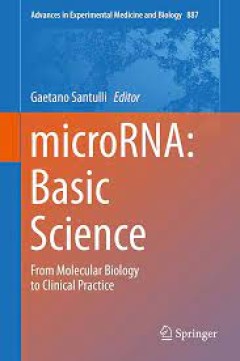
microRNA: Basic Science From Molecular Biology to Clinical Practice
This volume explores microRNA pathophysiology, focusing on basic concepts in molecular and cellular biology. Chapters contributed by leading scientists examine recently discovered pathways in several processes, including aging, diabetes, cardiovascular disease, hematopoiesis, and mitochondrial fitness. The authors contextualize microRNAs within epigenetics and micropeptidomics, angiongenesis an…
- Edition
- -
- ISBN/ISSN
- 978-3-319-22380-3
- Collation
- -
- Series Title
- -
- Call Number
- -

Marine and Freshwater Toxins
This book presents the structure of the main toxins of aquatic origin, their distribution, producing species and vectors, their mechanisms of action, the clinical aspects of envenomation in humans, their effects in laboratory or wild animals, their toxicokinetic properties, including the relevant treatment, detection methods and regulatory aspects for management. The work also presents the main…
- Edition
- -
- ISBN/ISSN
- 978-94-007-6418-7
- Collation
- -
- Series Title
- -
- Call Number
- -
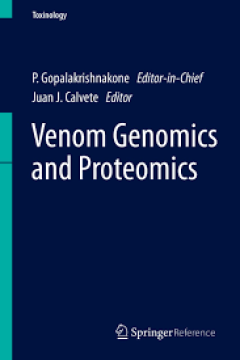
Venom Genomics and Proteomics
This volume provides the reader with recent advances in the fields of molecular toxinology, the biotechnological applications of venom toxins, and antivenom production. The content of the twenty chapters of Venom Genomics and Proteomics illustrates not only the enormous progress made since the implementation of omics technologies in the field of toxinology, but one also realizes the road still …
- Edition
- -
- ISBN/ISSN
- 978-94-007-6416-3
- Collation
- XXI, 454
- Series Title
- -
- Call Number
- -
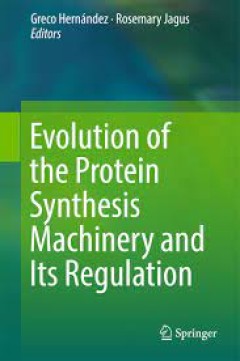
Evolution of the Protein Synthesis Machinery and Its Regulation
The “omics” era has given a new perspective to the findings on the origin and evolution of the process of translation. This book provides insight into the evolution of the translation process and machinery from a modern perspective. Written by leading experts in molecular biology, this text looks into the origins and evolution of the protein synthetic machinery.
- Edition
- -
- ISBN/ISSN
- 978-3-319-39468-8
- Collation
- Springer International
- Series Title
- -
- Call Number
- -
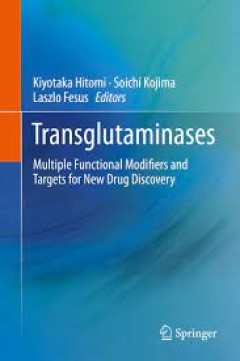
Transglutaminases
This book presents basic and extensive information on the physiological and pathological significance of the protein-modifying enzymes, transglutaminases, which are involved in multiple biological events by catalyzing a unique and important posttranslational modification reaction, cross-linking of proteins, and interacting with a large number of proteins inside and outside of cells. Although se…
- Edition
- 1
- ISBN/ISSN
- 978-4-431-55823-1
- Collation
- VIII, 391
- Series Title
- -
- Call Number
- -
 Computer Science, Information & General Works
Computer Science, Information & General Works  Philosophy & Psychology
Philosophy & Psychology  Religion
Religion  Social Sciences
Social Sciences  Language
Language  Pure Science
Pure Science  Applied Sciences
Applied Sciences  Art & Recreation
Art & Recreation  Literature
Literature  History & Geography
History & Geography